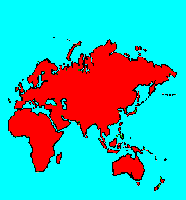SPECIES INFO
Whooping cough or pertussis is a human disease found almost worldwide. However, different strains are less serious than others. A potential threat can be found in African strains. Worldwide, about 80% of people exposed contract the disease. This disease is transmitted by inhaling droplets in contaminated air.The Bergey's Manual gives us a methodology of some preliminary divisions of Bacteria. This is referred to as section (4). This group contains Gram Negative aerobic rods and socci. Diseases caused by this group include whooping cough, pneumonia, and gonorrhea.
Eubacteria, the true Bacteria, is the group that contains most of the Bacteria that impact on our daily lives. Some of the diseases caused by Bacteria are: Cholera, Lyme Disease, Strep Throat, Scarlet Fever, Typhoid, Syphilis, and Gonorrhea.
Science has only begun the task or properly organizing this group of lifeforms into a taxonomy tree. The medical profession has begun with the disease causing organisms and has worked from the bottom up. They have been using various shapes and various forms of locomotion for criteria. On the other micro-biologists have been working from the top down. The result is a large open area in the middle. Here we have arbitrarily used the Bergey system for organizing disease causing bacteria in the first several classes, and have placed the algae groups in the higher classes.
Monera phylum includes the various bacteria. These are somewhat cellular organisms, but they lack a cell nucleus. Many of these organisms cause serious illness in humans. The diseases include Botulishm, Cholera, Diptheria, Gonorrhea, Lyme Disease, Plagues, Salmonellosis, Syphilis, Tetanus, Typhoid, and TB.
Monera kingdom includes the various bacteria. These are somewhat cellular organisms, but they lack a cell nucleus. Many of these organisms cause serious illness in humans. The diseases include Botulishm, Cholera, Diptheria, Gonorrhea, Lyme Disease, Plagues, Salmonellosis, Syphilis, Tetanus, Typhoid, and TB.

